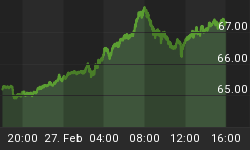When oil prices start to decline, investors and economists get worried. Oil prices in large part reflect global sentiment towards our economic future - prosperous, growing economies need more oil while slumping, shrinking economies need less, and so the price of crude indicates whether the majority believes we are headed for good times or bad. That explains the worry - those worried investors and economists are using oil prices as an indicator, and falling prices indicate bad times ahead.
But oil prices have to correct when economies slow down, or else high energy costs drag things down even further. And the current relationship between oil prices and global economic output is not pretty. In fact, every time the cost of oil relative to global production has hit current levels - and that's after the sharp corrections earlier this month - an economic slump, if not a recession, has followed, according to a Reuters article.
The "warning signal" that is currently flashing red is the Oil Expense Indicator, which is the share of oil expenses as a proportion of worldwide gross domestic product (specifically, it is oil price times oil consumption divided by world GDP). Since 1965, this indicator has averaged roughly 3% of GDP and has only exceeded 4.5% during three periods: in 1974; between 1979 and 1985; and in 2008. Each period saw severe global recessions.
In 1973/'74, the Arab oil embargo sent oil prices rocketing skywards in the world's first "oil shock." In 1979, a revolution in Iran knocked out much of that country's oil output and catalyzed the world's second oil shock. And, of course, in 2008 the housing bubble collided with speculative buying of new debt instruments and a commodities boom to propel oil prices to a record high of US$147 a barrel, which helped to trigger the global financial crisis and the worst slump since World War II.
So where are we right now? Well, Brent crude prices would have to fall to the low US$90s per barrel for the Oil Expense Indicator to drop below 4.5%. Instead of that, Brent prices have been above US$100 per barrel for more than six months (aside from an intraday low of US$98.97 on August 9) and are still hovering between US$105 and US$110.
Oil prices play a major role in global economic growth because oil is crucial to every part of the economy. It powers manufacturing as well as food and commodities production, it fuels transportation, and it is a building block for industries like plastics and electronics. When oil prices stay too high for too long, they choke out economic growth.
Merrill Lynch analysts agree, writing in a recent note: "The last two times that energy as a share of global GDP neared ... the current level, the world economy experienced severe crises: the double dip recession of the 1980s and the Great Recession of 2008."
So we face two options: oil prices come down sharply, or we enter a recession, which will drag oil prices down. Either way, crude has to get cheaper.
That being said, remember that there are many forces at play in the oil markets, not the least of which is supply. At present the world's most important supplier, Saudi Arabia, is pumping out more oil than it has for 30 years. In July the country produced 9.8 million barrels per day (bpd), lifting total OPEC production to 30.05 million bpd.
If they want, the Saudis can exert considerable influence over prices by reducing supply. And they may want to do just that. Oil analysts generally agree the Saudis want to see oil prices remain above US$85; lower oil prices would impair the country's ability to meet its spending obligations. Iran, Kuwait, and other OPEC countries similarly want to see oil prices remain strong, to meet their spending requirements. Current OPEC governor Mohammad Ali Khatibi, of Iran, recently said that the cartel's members have not set a desired price level but some think US$80 to US$90 is appropriate, while others want prices to remain above US$100 a barrel.
On top of that, no one is yet predicting a reduction in global oil demand. The International Energy Agency (IEA) reduced its forecast for demand growth, but still expects the world to consume 1.2 million more barrels of oil each day next year than this year. Similarly, OPEC reduced its demand growth estimate, but still foresees oil demand rising by more than 1 million barrels of oil a day over the next 12 months.
So, oil prices will come down when the economy falls too, but if oil goes on a tailspin à la 2008, expect to see OPEC step up to the plate, tighten the market, and support prices, so that its members can continue to pay their bills.
Oil supplies (and prices) are one element of a "triple threat" menacing the US. But every crisis presents opportunities... And you can turn this one to your profit, from oil as well as other energy sectors. This free report will get you started.















